Best Concrete Driveway Sealer – Everything You Need To Know
The best concrete driveway sealers prevent damage and maintain your driveway’s appearance. They protect against cracks and aesthetic deterioration. If you want to protect your concrete driveway and maintain its appearance, you need a good concrete driveway sealer. They form a chemical barrier between your driveway and damaging agents, protecting it while also giving it a polished beautiful look.
The best concrete driveway sealer for you depends on several factors. The first factor is the type of concrete driveway you have installed. It could be plain concrete, decorative concrete, exposed aggregate or stamped concrete. Different sealers are suitable for different concrete types. Another factor is your local weather conditions. In an area with extreme temperatures, frequent freeze-thaw cycles or high humidity, you will need a sealer that best handles these conditions. For instance, a penetrating sealer that offers deep protection will be better for you than an acrylic sealer that gives your driveway a glossy finish.
We created this comprehensive guide to help you determine the best concrete sealer that is just right for you. We will walk you through the different types of concrete driveway sealers, the factors you should consider, and the best sealers for concrete driveway on the market right now.
What Are Concrete Driveway Sealers?
Concrete driveway sealers are protective coatings applied to the surface of concrete driveways to protect them from water, oil, stains and other damage. These sealers not only protect your driveway, they also preserve the concrete’s integrity and improve its appearance. They improve the driveway’s appearance by giving it a richer and darker look.
All these help extend the lifespan of your driveway, while maintaining its aesthetic appeal all through its lifetime.
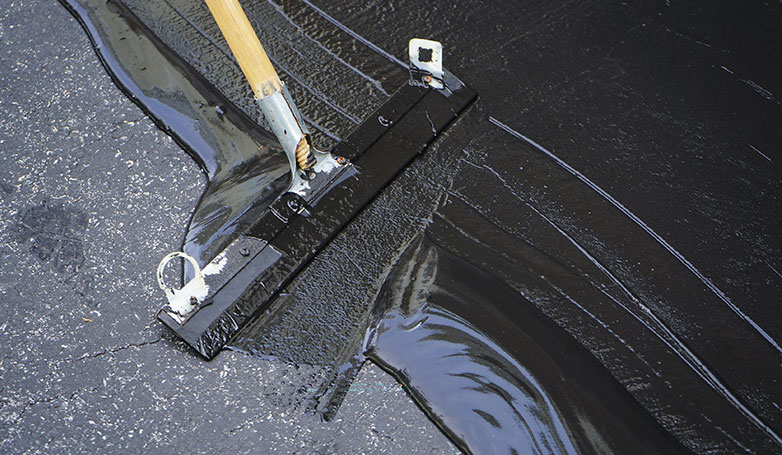
Types Of Sealers: Penetrating VS Topical
There are two main categories for the best concrete driveway sealers – penetrating sealers and topical sealers. Here we look at each of them in details.
Penetrating Sealers
Penetrating concrete driveway sealers are designed to penetrate the surface of your concrete driveway. The sealer then reacts with the minerals in the concrete to form a protective barrier. This protective barrier prevents water, dirt, oil or any other damaging elements from seeping into the concrete and weakening its structural integrity.
Penetrative sealers do not change the appearance of the concrete surface. They typically leave a natural, matte finish that highlights the concrete’s original look. This makes them an ideal option for you if you want a protective layer for your concrete driveway without changing its surface appearance.
Characteristics Of Penetrative Sealers
Penetrative sealers are an ideal option for you if you live in an area with harsh weather conditions. They provide excellent protection against moisture penetration, freeze-thaw or salt damage as they are within the concrete. This also makes them more durable for the long term.
Penetrating sealers are also relatively low maintenance. They do not need excessive care. Depending on the volume of traffic and weather conditions, penetrating sealers can last up to 10 years. Experts recommend reapplication once every 5-10 years.
Topical Sealers
Topical concrete driveway sealers are applied to the surface of the driveway. They then form a protective film that protects the driveway from moisture, oil, ultraviolet rays, stains and abrasions. This is why they are sometimes called film-forming sealers.
Topical sealers are available in different finishes including glossy, semi-gloss, satin or matte. Each of these finishes give your driveway a new and unique look. Thus, topical sealers are often used to change and enhance the appearance and aesthetic of the driveway’s surface. If you are looking to make your driveway glossier or shinier, then a topical sealer is your best bet.
Characteristics Of Topical Sealers
Topical sealers can be water-based or solvent-based. Water-based sealers provide a clear slightly milky appearance when applied. They are the best concrete driveway sealer for satin or matte finishes. Solvent-based sealers contain organic solvents like xylene or acetone. They are often used for high-gloss or shiny finishes.
Topical sealers require regular maintenance. Frequent cleaning and reapplication is necessary to maintain their effectiveness. Reapplication is also necessary because their durability is impacted by traffic and harsh weather conditions. Experts recommend reapplication once every 1-3 years.
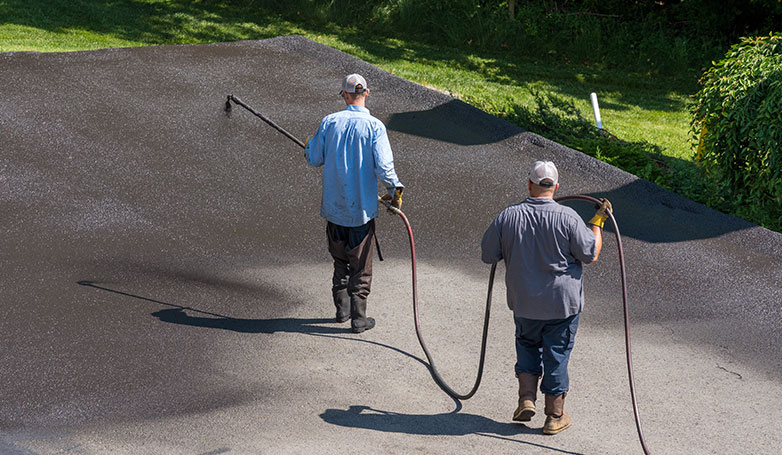
What To Consider When Choosing A Sealer
There are a lot of factors when choosing the best sealer for your concrete driveway. In this section, we look at the most important factors.
Climate And Weather Conditions
The climate in your region is a very important factor when deciding what concrete sealer to use for your driveway. In areas with high humidity or extreme cold temperatures that result in freeze-thaw cycles; concrete driveways will be vulnerable to water penetration, cracking and spalling. In areas with sunny, hot climates, the concrete driveway will need to be protected from UV rays.
Traffic Volume
The amount of traffic your concrete driveway receives is another factor to consider. If your driveway is heavily trafficked, you will need to prioritize durability over aesthetics when choosing a sealer. If your driveway only sees light traffic however, you can trade off long term durability for aesthetics and appearance.
Desired Finish
You also need to consider the type of finish you want for your driveway. If you like your driveway’s original concrete look, then you should choose a penetrating sealer. If you want to enhance its appearance however, and you’d like to add a glossy or shiny finish, then you should go for topical sealers.
Type Of Concrete
The type of concrete driveway you have installed is an important factor when choosing the best concrete driveway sealer for your project. Different types of concrete have different properties, and you should go with the sealer that is best compatible with these properties. For example, stamped concrete is usually more aesthetically appealing, thus a sealer that enhances aesthetics will be very compatible.
Ease Of Application
Some concrete driveway sealers may require specialized equipment or professional application. But others can be applied by homeowners without professional help. If you want to do it yourself, then you should choose a sealer that does not require special equipment or professional guidance.
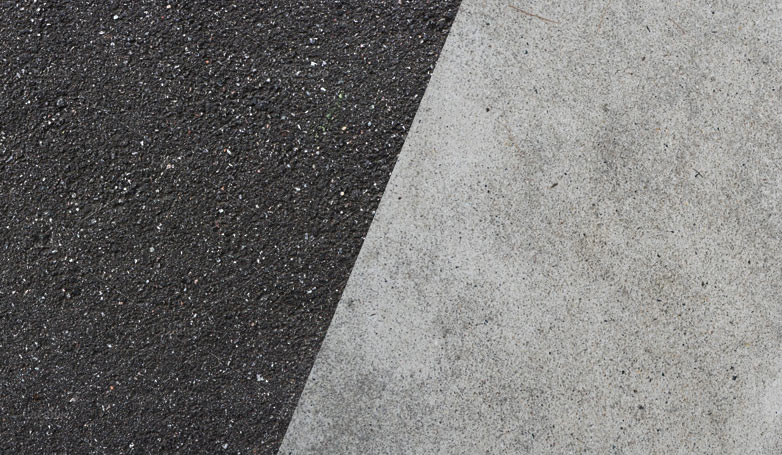
The Best 10 Concrete Driveway Sealers On The Market
Here are the best sealers for concrete driveways based on strength, pricing, UV protection and ease of use.
1. Acrylic-based Sealer
Acrylic-based sealers are the best concrete driveway sealer made from a blend of acrylic polymers and other additives that form a protective layer on the surface of the concrete. They enhance the appearance of the concrete driveway they are applied to with a glossy or satin finish.
Cost: $15 – $20 per liter
Pros
- Water repellent
- Oil resistance
- Easy to apply
- Moderate UV protection
Cons
- Requires frequent reapplication (every 1-3 years)
- May become slippery when wet
- Limited wear resistance
2. Penetrating Sealer
Penetrating concrete sealers, also called silicate sealers, are designed to penetrate the concrete. They react with the minerals in the concrete to form a protective barrier against moisture and damaging agents.
Cost: $15 – $20 per liter
Pros
- Longevity and Durability
- Excellent moisture protection
- Maintains natural concrete appearance
Con
- Limited surface enhancement
3. Epoxy Sealer
Epoxy sealers are high-performance topical concrete driveway sealers. They form a tough, durable and glossy surface on the concrete. Epoxy sealers are made by combining epoxy resins with other additives. They are popular for their high resistance to chemicals, abrasion and wear.
Cost: $12 – $20 per liter
Pros
- Durability
- Water repellant
- High chemical resistance
- Attractive glossy finish
Cons
- Requires meticulous driveway surface preparation
- May turn yellowish over time
4. Silane/Siloxane Sealer
Silane/siloxane sealers are a type of penetrating concrete sealer made from a blend of silane and siloxane compounds. They are best concrete driveway sealer that can penetrate the surface of the concrete to create a hydrophobic barrier. This barrier protects your driveway’s surface from damage.
Cost: $10 – $20 per liter
Pros
- High water repellency
- Durability
- UV protection
- Protection against freeze-thaw damage
Con
- Limited aesthetic improvement
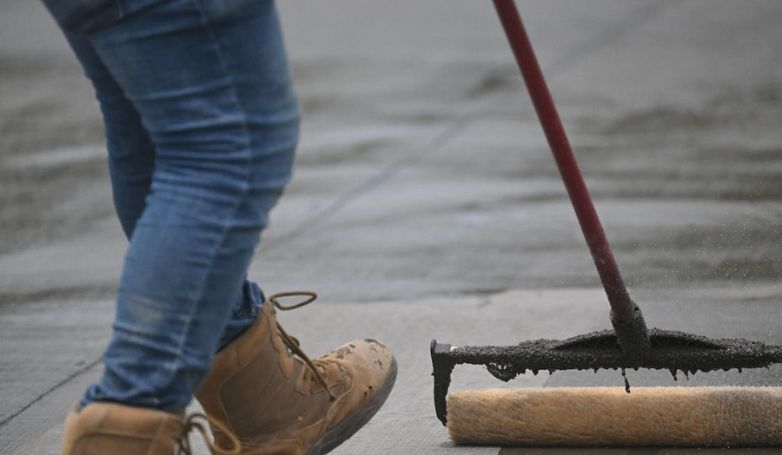
5. Polyurethane Sealer
Polyurethane sealers are topical concrete sealers that form a strong, flexible and glossy film on the surface of the concrete. They are known for their high resistance to UV rays, chemicals and abrasion. Polyurethane sealers can be used to produce a range of finishes, from high gloss to satin. They can also be used on indoor and outdoor concrete surfaces.
Cost: $15 – $20 per liter
Pros
- High abrasion resistance
- UV resistance
- Scratch and chemical resistance
Cons
- VOC (volatile organic compounds) emissions
- Require professional application
- Long drying time
6. Wet Look Sealer
Wet look sealers are topical concrete sealers designed to enhance the appearance of the concrete by giving it a glossy wet look. They are usually made from acrylic or urethane compounds. They form a shiny and glossy protective film on the surface of your concrete driveway.
Cost: $10 – $15 per liter
Pros
- Enhances color and shine
- Results in a wet attractive look
- Protection against stains and fading.
Cons
- Slippery when wet
- Limited UV resistance
- Requires frequent reapplication
7. High Gloss Sealer
High gloss sealers are the best concrete driveway sealer that provide a very glossy reflective finish to the concrete. They are designed to enhance the appearance of your concrete driveway. They are often used for decorative concrete or exposed aggregate types.
Cost: $10 – $15 per liter
Pros
- Enhanced glossy appearance
- Protection from staining, fading and weathering
Cons
- Highlights the imperfections in the concrete
- Require frequent reapplication
- Requires careful application
8. Matte Finish Sealer
Matte finish sealers are topical concrete sealers that result in a more toned-down finish. They are more durable than most other topical sealers. And they also maintain your concrete driveway’s original look.
Cost: $10 – $15 per liter
Pros
- Hides imperfections or flaws in the concrete
- Durability
Cons
- Limited aesthetic enhancement
- Requires more effort to clean than glossier finishes
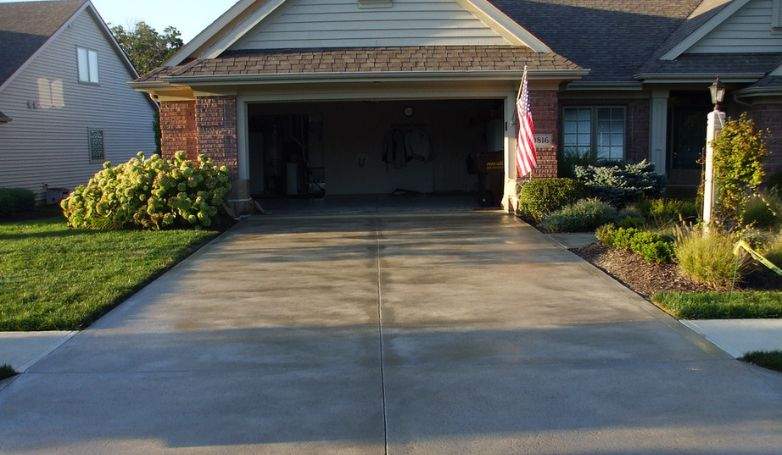
9. Film-foaming Sealer
Film-forming sealers are topical concrete sealers that create a protective film on the surface of the concrete. They provide strong surface enhancement for your concrete driveway. They protect the driveway from moisture, spills and other damaging contaminants.
Cost: $10 – $15 per liter
Pros
- Excellent surface enhancement
- Protection from moisture and spills
- Easy to maintain and reapply
Cons
- Require stripping before reapplication
- Require frequent reapplication
10. Natural Look Sealer
Natural look sealers are concrete sealers that are designed to maintain the concrete’s original look while providing protection against damaging elements. They are breathable i.e they do not trap in moisture. Thus, they are often durable and do not need frequent reapplication.
Cost: $15 – $20 per liter
Pros
- Maintains the concrete’s original look
- Breathability
- Water repellent
- Suitable for indoor and outdoor concrete surfaces
Cons
- Limited aesthetic enhancement
Factors To Consider When Choosing The Right Concrete Driveway Sealer
Now that you know the best concrete driveway sealers in the market, its important to find the sealer that fits your hardscape goals. Before you choose from our guide you must consider:
- Cost-effectiveness
- Environmental impact
- Application process and ease of use
- Maintenance requirements
- Longevity and Reapplication
- Regulatory compliance
- Driveway characteristics
- Brand and Product reputation
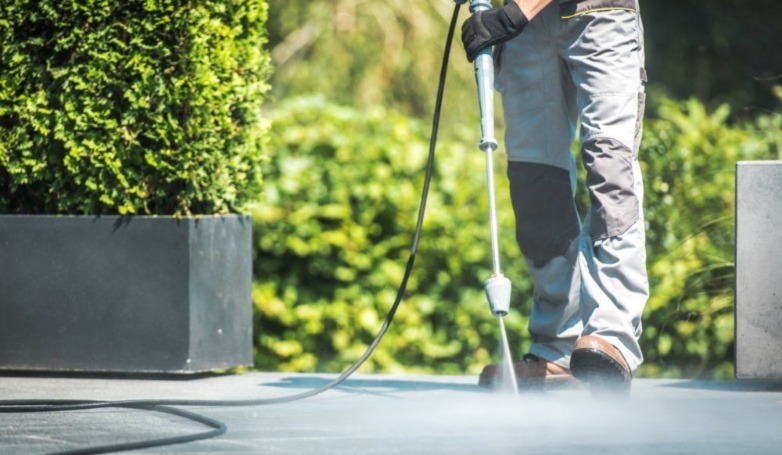
Best Practices To Maintain The Results Of The Concrete Driveway Sealer
Without any doubt, sealers help improve the longevity of your concrete driveway. But neglecting your driveway after sealing can still damage your paving. Here are seven ways to maintain the sealant-effect.
Regular Cleaning
Keep your concrete driveway clean by periodically sweeping away dirts and debris from the surface. You can also pressure wash periodically with mild detergent to remove stains, spills and accumulated grime.
Avoid Harsh Conditions
Harsh chemicals can damage the best concrete driveway sealer and even the concrete itself, so avoid using it. Deicing salts can sometimes have the same effect especially if they are not compatible with your concrete sealer. So, avoid using any harsh or deicing chemicals.
Prompt Spill Cleanup
Do not let any spilt oil or automotive fluid soak into the concrete. Clean them up immediately and they are split. Use absorbent material like cat litter or sawdust.
Proper Winter Care
Pay extra attention to maintaining your driveway during the winter. Avoid using rock salt or deicing chemicals which may damage your concrete and the sealer. Use sand or non-corrosive deicers like calcium chloride to provide traction on your concrete driveway when it gets icy.
Reapply Sealer As Needed
Pay close attention to the condition of your concrete sealer. When you notice that water notice is no longer beading on your driveway’s surface or if the color starts fading; it might be time to reseal your concrete driveway by reapplying the sealer. Also pay attention to the sealer’s lifespan provided by the manufacturer to know when to start thinking of resealing.
Avoid Heavy Objects
Avoid placing heavy objects or parking heavy vehicles on your concrete driveway for long periods of time. As heavy objects can cause indentation and damage to the concrete sealer if left for a long time.
Inspect Regularly
Inspect your concrete driveway regularly for signs of wear and tear, damage or areas where the sealer might have worn thin. Regular inspection helps you notice and address these issues promptly and prevent further deterioration.
Conclusion
We have covered it all about the best concrete driveway sealers. We’ve talked about the different types of sealers, their pros and cons, the best maintenance practices and how to choose the right one for you. Achieving a beautiful and durable concrete driveway is now within your grasp, Congratulations!

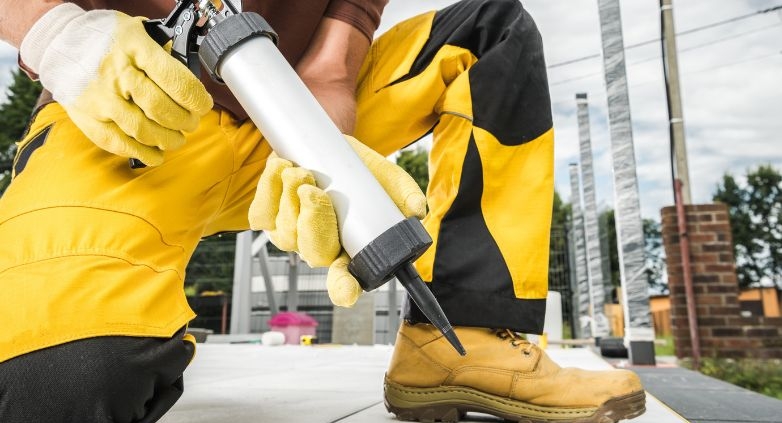

Leave a Reply
Want to join the discussion?Feel free to contribute!